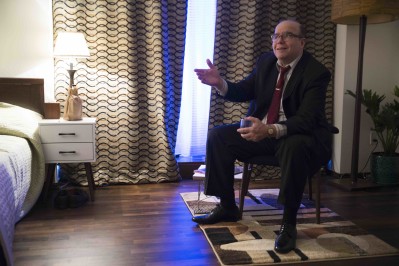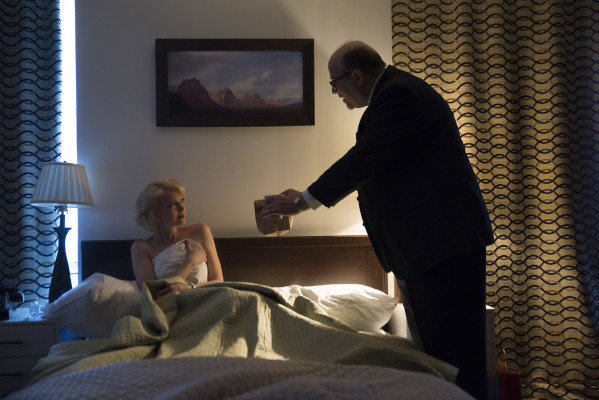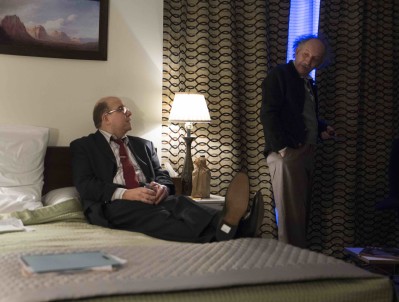INTERVIEW: Michael Pemberton plays a familiar politician in hotel-staged ‘Insignificance’

Michael Pemberton works in a hotel.
He’s not a desk clerk, manager, cleaner, cook, waiter or concierge. In this hotel, he’s a senator.
Let’s back up.
Pemberton, a successful actor on Broadway and in films and television, is playing the Senator role in the acclaimed production of Insignificance from British playwright Terry Johnson. The play, which details a chance encounter among Marilyn Monroe, Joe DiMaggio, Albert Einstein and Sen. Joseph McCarthy, is staged on the fifth floor of Langham Place, a hotel on Fifth Avenue in New York City.
Each night, little more than 50 audience members head into a hotel room to watch the drama unfold. The intimate setting adds a definite mystique and vibe to the production, which is brought to the United States thanks to director James Hillier and the defibrillator theater company.
“I’m attracted to interesting projects, and this was one,” Pemberston said recently in a phone interview. “So I went in and auditioned, and oddly some people have asked me this, the fellow who is playing Einstein, Max Baker, is a very old friend of mine. We met in grad school in Detroit in 1990, and we were roommates for a while when we first came to the city. So we go way back, and it was a complete fluke of the universe that we wound up in this production together. So that’s a lot of fun, too. But I was attracted by the material. I read the script. I thought, very smart, very funny and had a great deal of depth beyond that. It wasn’t just a fluffy piece.”

Pemberton found the site-specific angle of the play fascinating. By viewing these four actors in an intimate hotel room, the audience has a chance to be flies on the wall. What does it mean for the audience to hear the characters breathe? Chuckle? Whisper in the dark?
“What does that do to the audience,” Pemberton asked. “What does it do to me as an actor? These are all attractive explorations.”
The actors didn’t know how small or large the hotel room would be until the first day of rehearsals. If they were expecting a large suite, they were wrong. Pemberton called the space an “executive room” where the actors share the floor with 54 of their “closest friends.”

Pemberton’s role is known simply as the Senator, and audiences will surely recognize McCarthy, the demagogue from the middle of the 20th century who persecuted suspected Communists with accusations and theatrical congressional hearings. Audiences might remember Edward R. Murrow’s scathing expose on the Wisconsin senator, an historical episode that was dramatized in George Clooney’s Good Night, and Good Luck.
However, not all of the tie-ins are necessarily historical.
“Well, it’s kind of easy in this political year,” Pemberton said. “There’s all kinds of character research available to me every day, and I say that with humor. But it’s also true. I went back and I dug into the archives of unique video footage that was available of McCarthy, and it struck me as I was watching him speak that his rhythms, his approach, his attitudes reflected a lot of things that we’re seeing in some of the political candidates today. So I literally would record some of the debates and other statements by some of these people and sort of let myself find those rhythms, the political rhythms of these people.”
The actor’s research discovered that McCarthy was also famous for his social nature. He was apparently popular at parties even though he was vilified in the Senate.
“Again I think we have some examples of that in today’s political environment, and I read a wonderful biography on McCarthy, which revealed his upbringing and where he came from,” Pemberton said. “This play does not name these characters. I’m called the Senator. She’s called the Actress. He’s called the Scientist and the Ballplayer. We know that it’s based on these figures; however, the Senator is the least specific. At the time that Terry Johnson wrote this back in ’82, he was a 24-year-old English fellow writing this sort of interesting piece that in many ways is a reflection on fame and the cost and the price one pays for fame. My character is an antagonist who is trying to use other people’s fame for his own benefit, so he’s not as famous as everybody at that time.”
Originally, the Senator role was written as a southern politician, not one from Wisconsin. The director of this production asked Pemberton to drop the southern accent during the audition and change to a more northern accent.
“So I did that,” he said. “We thought, this is good. We’re going to go with this and direct into the teeth of who this fellow was, and I think it really served the play well.”
Besides Pemberton and Baker, Anthony Comis and Susannah Hoffman also star in the production. Pemberton had nothing but laudatory comments for his colleagues in the hotel room and the behind-the-scenes team as well.
“I have never worked with a more collaborative group,” he said. “There literally was no ego in that room when it came to working on these pieces. James, in fact, found, hired an American assistant director specifically because he said, ‘I need an American perspective.’ … He just felt that he needed that extra help, and he was wide open to the suggestions of, well, everybody. Like I said, true collaborator. He would let us go up there and kind of explore and find things, and then he would help shape that. But there were times when he would say, ‘Listen, if you have a different approach, a different idea, let’s take a look at it.’ We found a lot of new ways to approach these scenes.”
Before becoming an actor, Pemberton had jobs as a salesman and in a flour mill, and he also served time in the military. He chose acting because he fell in love with the theater. An influential teacher had him read a play a day for basically four years. This exposed a younger Pemberton to Arthur Miller, Tennessee Williams and other theatrical legends. Today, he’s an in-demand actor who played Broadway in The Farnsworth Invention and I’m Not Rappaport, among other productions. He can also be seen in such films as Bridge of Spies by Steven Spielberg, An Honorable Man and Brooklyn’s Finest.
“I really fell in love with stagecraft and connection with the audience,” he said. “So I never wanted to give that up, and for my first decade in New York, I did exclusively theater. And then you begin to realize I can supplement that by doing some of this TV work that folks are doing. So that started for me with Law & Order because you’re not in an actor in New York if you haven’t done at least one Law & Order. And I find that all of these forms require a different approach and exercising different acting muscles. So I make a conscious effort to go back and forth. I try and do at least two plays a year and mixed in with the television and film work that I’m lucky enough to do. And it makes for a pretty round diet, if you will, of opportunity to explore the human condition, but the stage is always where I feel most at home.”
Insignificance, which plays through March 20, molds together the cinematic and theatrical. Because of the close quarters and intense stares from the nearby patrons, acting in this four-person play can feel like shooting a take on a film set.
“We’ve got 50 cameras placed around the room, and you can’t break concentration,” he said. “You can’t have a false moment because if you do the camera will see it, but unlike film and television where you’ll do a take of a small scene or section and then redo it again and then redo it again, there’s no redo. It’s full-on concentration the entire time you’re on stage, which is … an exciting prospect. It’s something you long for the opportunity to really stretch your muscles in that way.”
By John Soltes / Publisher / John@HollywoodSoapbox.com
- Insignificance, starring Max Baker, Anthony Comis, Susannah Hoffman and Michael Pemberton, is currently playing Langham Place on Fifth Avenue in Manhattan, N.Y. Visitors meet in the lobby and then are whisked away to a hotel room, circa 1953, on the fifth floor. Click here for more information on tickets.

